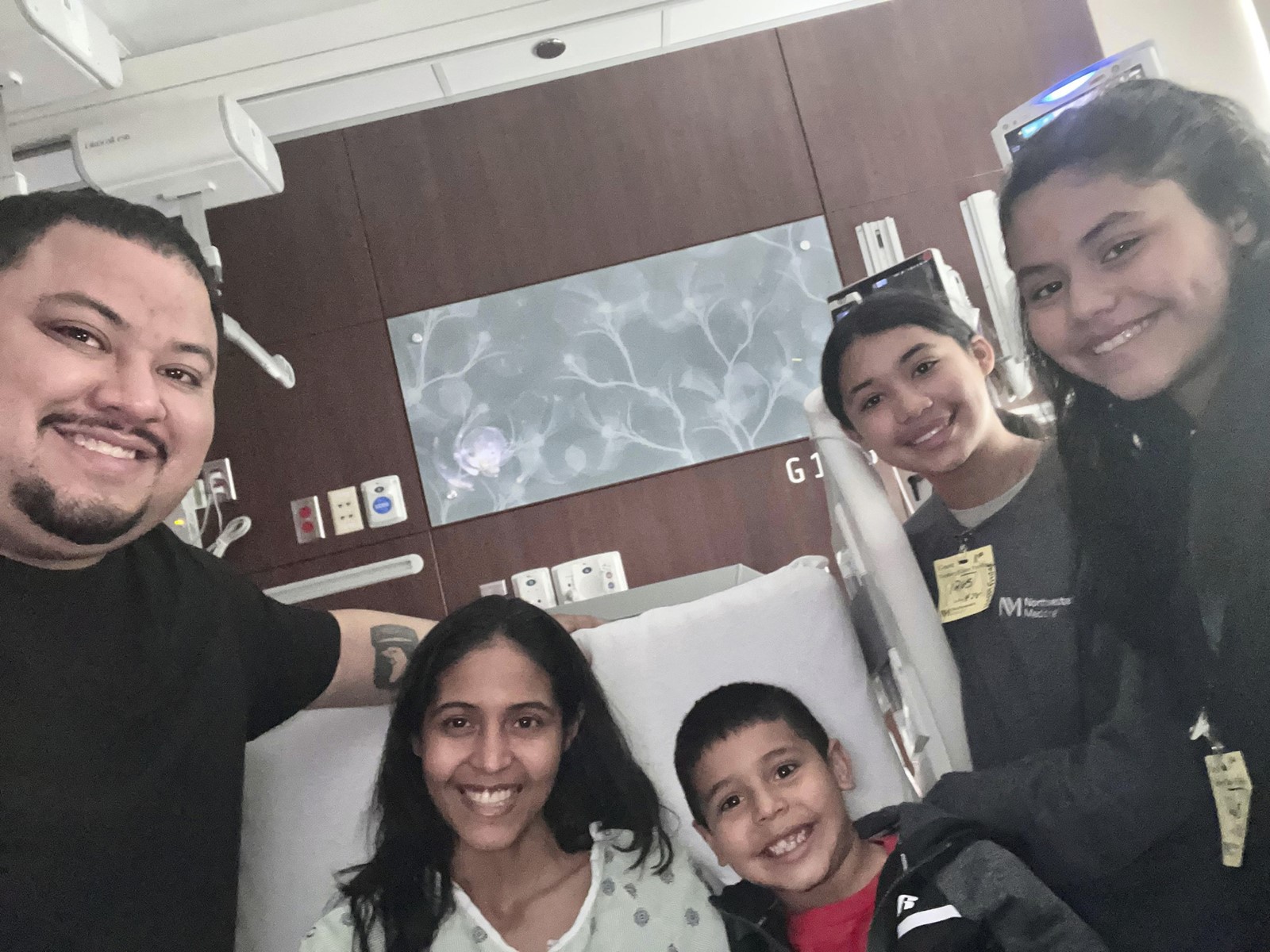
Talking to Jessenia Diaz via phone from her hospital bed at Northwestern Memorial Hospital in Chicago, it was hard to imagine she’d just undergone a double lung transplant only eight days earlier.
“I feel amazing,” she said Wednesday, her voice strong, exuberant even, as she tells me about that last chest tube being removed, which means she will be released from the hospital soon.
“I can now take a huge breath in and out without coughing, without straining. It feels like a new beginning. I’m ready to take on the world.”
Superwoman might be an overused, overhyped word these days, but it certainly seems to fit this 35-year-old Yorkville wife and mother of five young children, including two sets of twins.
That alone should qualify her for sainthood. Add the fact she raised the first set of twins on her own for almost a year after husband Martin was deployed to Afghanistan. And she did so while battling sarcoidosis, a rare and incurable autoimmune disease she developed at age 7 that only became more life-threatening as it moved from her spleen to her lungs.
After the birth of the couple’s third child in 2017 — and as Martin was transitioning to civilian life back in their hometown of Aurora — Jessenia’s oxygen capacity began to deteriorate. Her cough that had always been bad but manageable and seasonal was now constant and so severe it became difficult to keep food down.
The young woman’s only reprieve as she grew older seemed to come when she was pregnant.
Then, with a weakened immune system, COVID-19 hit her hard — three times. In 2020 Jessenia gave birth to a second set of twins. But after this pregnancy her health began to spiral even more.
Walking up steps, holding her young children, doing household chores, cooking, even getting dressed became hard or impossible to do.
“I could not talk or even breathe very well,” she said, which meant going on oxygen while at home.
While the thought of not making it through this journey would “pass my mind,” Jessenia told me, “I was always hopeful.”
That hope was renewed a year ago at Northwestern Memorial Hospital, where doctors were determined to put more than a Band-Aid on her condition, she said. But even new medications began to fail, and as those hospital stays became longer and more frequent, it was obvious only one real option remained: new lungs.
In January Jessenia began receiving nourishment through a feeding tube to put weight on her 90-pound frame and qualify her for the lung transplant list. For nearly two months, as life became an arduous waiting game, she and her husband fell back on the one thing that helped them get through so much.
“One-hundred percent, it was our faith,” said Martin, who underwent hip replacement a couple years ago from an injury sustained in a fall while dodging a rocket-propelled grenade in Afghanistan.
“I had my moments, away from everyone, where the realization hit that life is not always perfect and that bad things happen we can’t explain. I would pray through it … faith got me through it all.”
As is it did his wife.
“That was the only way forward,” Jessenia said. “We have to leave it in his hands and trust and follow.”
On the morning of April 17 the call came from the Northwestern transplant team: Jessenia was the backup recipient of a pair of new lungs. The couple arrived at the hospital by early afternoon; that evening, after critical testing, they were told her body was the better fit for the organs.
It was 11:30 p.m. when the surgery began. Four hours later Martin got word that Jessenia’s body was gladly welcoming those two new lungs.
Recovery has been going well, with a minor setback late in the week when Jessenia’s heart experienced a short period of arrhythmia. While double lung transplant patients can stay up to a month in the hospital, her stay is likely to end up being around two weeks, thanks in large part, said Martin, to his wife’s young age and overall good health.
Jessenia describes the functioning of her new lungs like a balloon, with air going in and out that will gradually stretch them to full capacity. Her husband, a baseball fan, likes to compare them to a leather glove that has to be broken in to enjoy its full potential.
Both know that plenty of occupational and physical therapy are ahead of Jessenia, including a few days of full-time rehab before they head home for that sweet reunion with the children. While the older three have been able to visit their mom a couple times in the hospital, the toddler twins, Martin said, are “really missing their mommy.”
It’s been an emotional journey for the family, no doubt about it. But each normal breath Jessenia’s now able to take is a reminder of the “new life” she’s been granted, thanks to an anonymous donor who she hopes will someday be revealed so she can thank that person’s loved ones for the remarkable gift she’s been given.
No wonder she wants to use this second chance to pay it forward.
Jessenia told me it took a couple of years for doctors to diagnose her disease because it’s so rare in young children. But she takes comfort knowing the lessons learned from her own challenges will benefit other young patients. And her plan is to continue to use this journey to help those going through similar struggles.
“I take no breath for granted,” said Jessenia.
Nor does Martin.
“I feel her faith,” he said of his wife. “It is pure beauty.”
dcrosby@tribpub.com


 PREVIOUS ARTICLE
PREVIOUS ARTICLE
